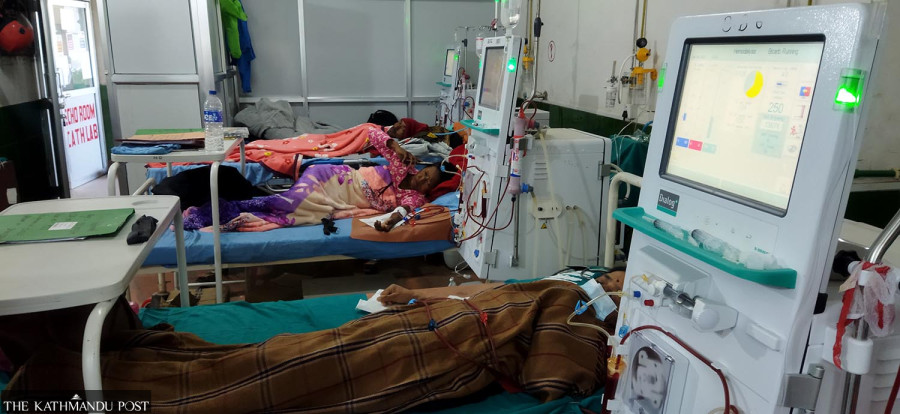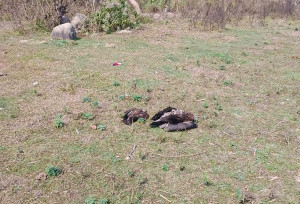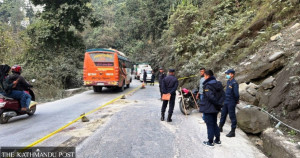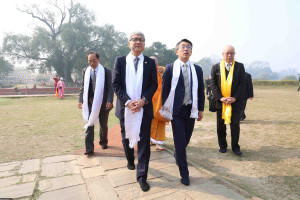Lumbini Province
Kidney patients face long wait for dialysis at government hospitals
Although the dialysis service is free of cost at government hospitals, patients and their families are breaking their backs buying expensive medicines.
Rupa Gahatraj
Mina Tharu’s husband has been suffering from kidney disease for over a year now. He returned from foreign employment a year ago and needs regular dialysis to survive. But the couple, who live in Badhaiyatal Rural Municipality-4, Bardiya, are having a hard time managing medical costs.
Mina takes her husband to Bheri Hospital in Nepalgunj where the dialysis is done free of cost but the cost of medication required for her husband is breaking her back, says Mina.
“Only free dialysis is not helping kidney patients from poor families like us. The medicine is so expensive and even though the government provides some free medicines, they are hard to come by at hospital pharmacies,” said Mina. “We have been selling our belongings one by one to cover the medicine cost.”
Medication for kidney patients on dialysis costs above Rs3,000 per visit.
“My husband has to go through dialysis twice a week in order to live. I don’t think we can continue the treatment for a long time because we are running out of money and people to take loans from. In a few months, we may not have anything to eat. The government hospitals provide free dialysis service but we have to pay for the bed and medication,” said Mina. “Also, we have to wait for our turn for free dialysis service. Sometimes we are made to wait for months.”
Rampyari Tharu of Rajapur Municipality whose husband also suffers from kidney disease and has been dependent on dialysis for several years is also facing financial problems.
Rampyari’s husband also goes to the Bheri Hospital for dialysis. But the couple has been waiting for his turn for dialysis since September 7. “I take my husband to private hospitals from time to time for dialysis since it is difficult to get dates at the hospital,” she said.
“We come from a working-class family and don’t have much. All our savings went into my husband’s treatment. Now we have been selling our valuables to continue his treatment,” said Rampyari. “We don’t even get the free medicines. There is always a shortage of free medicines in the hospital’s pharmacy. Every time we have to spend from Rs7,000 to Rs10,000 at private hospitals. One has to wait for months in order to get free dialysis service from the government hospital and my husband needs dialysis twice a week.”
Like Rampiyari and Mina, families of kidney patients see no recourse but to take the patient to private hospitals and clinics for dialysis where they have to spend more than they would at government hospitals.
Currently, 86 people are waiting for dialysis at Bheri Hospital. On average 27 people receive dialysis service from the hospital daily. Although there are 10 machines, only four machines are currently in use. It takes four hours for one person to complete dialysis, which is conducted in three stages in 24 hours. According to Ram Kothari Tharu, a paramedic employee of Bheri Hospital, the other six machines are not in operation due to technical reasons. The machines have been taken to Kathmandu for maintenance.
Narayani Devi Shrestha, a 76-year-old woman from Khajura Rural Municipality-3, got her free dialysis after waiting for three months at Bheri Hospital.
“Poor people have to suffer in silence. Those who have the money to go to private hospitals have a choice but poor people like us cannot even do that. The government should increase the capacity of the dialysis service according to the flow of the patients,” said Subadhra Shrestha, Narayani Devi’s son.
Dr Parash Shrestha of Bheri Hospital said that patients suffering from kidney disease have to receive regular blood transfusions, and the possibility of hepatitis C infection during blood transfusions is very high. There is no dialysis service available for hepatitis C infected patients anywhere other than Kathmandu and Teaching Hospital in Kohalpur, Shrestha said, adding that several kidney disease patients have also died because of not receiving regular dialysis.
Ram Kothari, the paramedic, said that there is no data on how many on the waitlist are still alive. “The situation is getting harder every day,” she said.
Dialysis service in Nepalgunj Medical College Teaching Hospital, Kohalpur resumed after a gap of one week on December 10. The hospital had a contract with Birang Health Care, a private company, for conducting dialysis services for patients of the hospital for the past three years. The health care centre stopped the dialysis service when the hospital failed to pay its dues.
Recently, the government decided to allow only public hospitals and medical colleges that have a contract with the government to run dialysis services. However, according to the hospital administration at the medical college, the government has not provided funds for dialysis to them since mid-June 2021.
Dr Resham Bahadur Rana, director of the medical college, said that they had to stop the services temporarily when the contract with the private clinic was terminated. “Kidney patients suffered a lot and some patients even died,” Rana said. “Some patients were forced to go to India.”




 21.24°C Kathmandu
21.24°C Kathmandu















